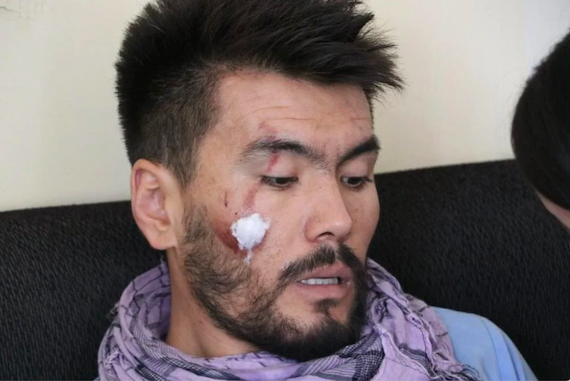Human Rights Watch | -(New York) – Taliban authorities in Afghanistan have been detaining and assaulting journalists and imposing new restrictions on media work, Human Rights Watch said today. The Taliban should call a halt to the assaults, drop the restrictions, and ensure that Taliban members responsible for abuses against protesters and journalists are appropriately punished.
On September 7, 2021, Taliban security forces detained Taqi Daryabi and Nemat Naqdi, journalists from the Kabul-based media outlet Etilaat-e Roz. The reporters had been covering protests by women in Kabul demanding an end to Taliban violations of the rights of women and girls. Etilaat-e Roz reported that Taliban authorities took the two men to a police station in Kabul, placed them in separate cells, and severely beat them with cables. Both men were released on September 8 and received medical care at a hospital for injuries to their backs and faces.

Journalists beaten while covering protests in Kabul, Sept. 7; Copyright Private
“Taliban authorities claimed that they would allow the media to function so long as they ‘respected Islamic values,’ but they are increasingly preventing journalists from reporting on demonstrations,” said Patricia Gossman, associate Asia director at Human Rights Watch. “The Taliban need to ensure that all journalists are able to carry out their work without abusive restrictions or fear of retribution.”
The Taliban authorities also detained a Tolonews photojournalist, Wahid Ahmadi, on September 7, and released him the same day. They confiscated his camera and prevented other journalists from filming the protest.
Since early September, Afghan women and girls in several cities have held protests against Taliban’s violations of women and girls’ rights, including denial of their right to education and access to employment. Women have spearheaded these protests, but increasingly men have joined them. On September 7, hundreds of protesters – both women and men – marched through Kabul chanting slogans critical of the Taliban.
Taliban security forces have broken up most of these recent demonstrations by beating protesters, confiscating and damaging cameras, and threatening reporters. On September 7 the Taliban announced that protests, in general, are illegal unless approved ahead of time. Journalists covering some protests have said that Taliban officials have told them that reporting on protests is also now illegal.
Taliban commanders and fighters have long engaged in a pattern of threats, intimidation, and violence against members of the media, and have been responsible for targeted killings of journalists.
International human rights law prohibits arbitrary restrictions on the rights to freedom of speech and expression, including by detaining journalists and banning media outlets, and to peaceful assembly.
“Taliban authorities are obligated under international law to respect and uphold everyone’s right to peaceful protests and to respect the rights of women and girls,” Gossman said. “Concerned governments should press the Taliban to protect free expression and peaceful assembly.”


 © 2026 All Rights Reserved
© 2026 All Rights Reserved